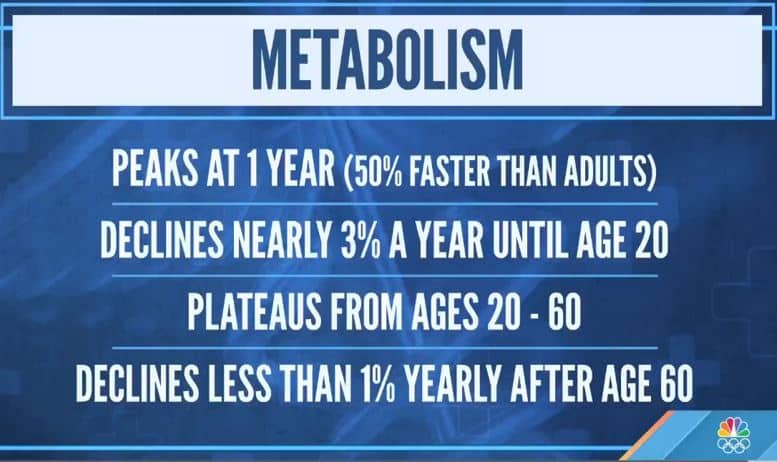Throughout our adult lives, we’ve had a scapegoat for age-related weight gain: a slowing metabolism. But, our excuse for the hard-to-lose extra weight through pregnancy and menopause has now been scientifically debunked. It’s not our metabolism.
We took a look at a recent study published in Science Magazine that included 6,400 participants from hundreds of countries between the ages of 8 days to 95 years old. It studied the expenditure of CO2, or the metabolism, which is how we expend energy. This revealing study was authored by Herman Pontzer, an associate professor of evolutionary anthropology at Duke University and author of Burn, a new book about the subject.
The findings were surprising for many people. It started by defining four stages of metabolism, from birth to death. Understandably, the fastest metabolism occurs in a rapidly growing baby between the age of 8 weeks and one year. After that, it gradually slows 3% a year until age 20.

But, after age 20, it’s always been assumed that our metabolism slows down, and there’s really not much we can do about it. However, the study indicated that until we reach 60, our metabolism does not slow down. On a recent episode of the NBC Today Show, Dr. Natalie Azar, MD, said what we’re all thinking: this is good news because it means we are actually more in control of our weight than we thought.
Metabolism

To truly comprehend what this study is indicating, let’s get a better understanding of what metabolism is and how it works. According to Samantha Cassetty, registered dietician, your BMR, or basic metabolic rate, “accounts for 70-80 percent of the calories you burn, and it’s highly variable from person to person. Age, gender, genetics, hormones, and muscle mass play a role in your BMR.” While we can’t control most of the criteria that establish our BMR, we can regulate the amount of muscle mass in our bodies, i.e., how much we exercise and what type of workouts we integrate into our daily routines.
According to Cassetty, the amount of exercise we do won’t necessarily help us boost our metabolism overall. However, she states that “it’s a factor that’s well within your control. In addition to burning some calories, a big advantage of exercise is that it helps you increase your muscle mass. The more muscle you have, the higher your BMR will be since muscle is a very active tissue that demands a lot from your body. A bonus is that exercise reduces your risk for heart disease and diabetes.”
Her bottom line is that while exercise can potentially give your metabolism a slight boost, the reality is that what we eat is more important than how hard we workout. So, instead of putting yourself through extreme workouts seven days a week, enjoy the movement you are getting and do exercise that you enjoy. And more importantly: eat a healthy, well-balanced diet while you’re at it.
You are what you eat.

During the NBC Today show interview, registered dietician Kristen Kirkpatrick reminded us that “you can’t outrun a bad diet.” Unfortunately, according to Kirkpatrick, most of what we Americans eat are hyper-palatable foods, which are foods that aren’t very healthy, but they’re created to make us want to eat more and more. Think about Doritos or your favorite snack food. If you wonder why you can’t eat just one, it’s because they’re designed to be hyper-palatable, i.e., extremely tasty and delicious but typically full of nutrient-poor ingredients. Most processed foods are designed using this approach. Quips Kirkpatrick, “There’s a reason we can’t stop eating potato chips but can a bowl of broccoli!”
Kirkpatrick suggests the best thing we can do is to eat real food. She further demystifies real food as “food that occurs naturally in nature or food that can rot.”
So what foods can at least assist your metabolism?
Cassetty states, “You’ll get a slight boost if you’re eating sufficient protein (foods like chicken, tuna, eggs, chickpeas, and Greek yogurt), and this macro has another advantage. It keeps you fuller, longer, so it helps manage hunger.”
Conclusion
Professionals who have looked through the study results have shown surprise at the potentially changing mindset on metabolism. There’s also a shifting philosophy on how we’ve viewed weight gain – especially during our midlife – and the causes and solutions we can take to maintain or lose weight. The study also showed the importance of meeting our dietary needs as we pass through the four stages of metabolism. Pontzer reveals the findings in early life highlight the critical importance of infant nutrition in meeting the increasing energy demands of growing babies. The study results could also affect how much medicine people need at various ages and how metabolism will affect how drugs are prescribed.
The silver lining of the study is that we’re more in control of our weight management during a large portion of our lives than previously thought. And that’s definitely good news.
Are you curious about your metabolism? Check out Lumen’s Metabolism Tracker – it’s the world’s first hand-held, portable device to accurately measure metabolism.
Always consult your medical practitioner for specific advice related to your healthcare.
Read Next:
The Metabolism Whisperer: A New Way to Eat
5 Weight Training Exercises You Need to Start Now
Winter Workout: Adapting Your Exercise Routine for Cold Weather







